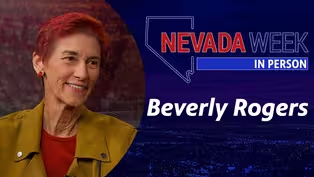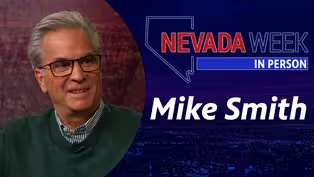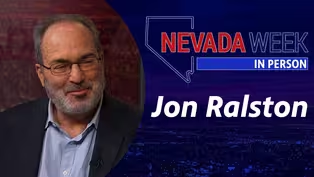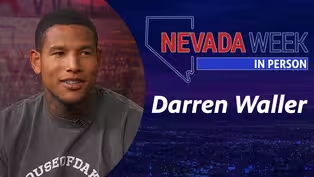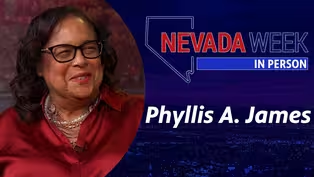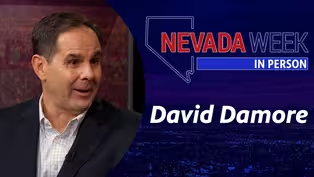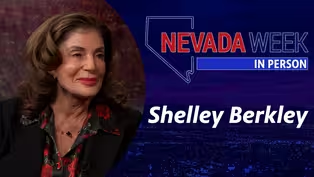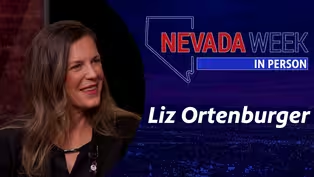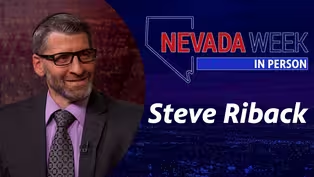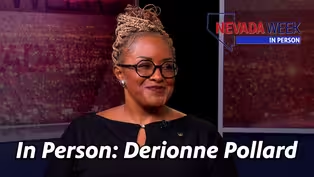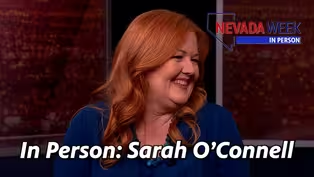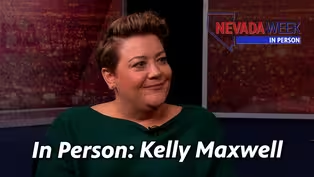
Nevada Week In Person | Tyre Gray
Season 1 Episode 41 | 14m 1sVideo has Closed Captions
One-on-one interview with Nevada Mining Association President Tyre Gray.
One-on-one interview with Nevada Mining Association President Tyre Gray.
Problems playing video? | Closed Captioning Feedback
Problems playing video? | Closed Captioning Feedback
Nevada Week In Person is a local public television program presented by Vegas PBS

Nevada Week In Person | Tyre Gray
Season 1 Episode 41 | 14m 1sVideo has Closed Captions
One-on-one interview with Nevada Mining Association President Tyre Gray.
Problems playing video? | Closed Captioning Feedback
How to Watch Nevada Week In Person
Nevada Week In Person is available to stream on pbs.org and the free PBS App, available on iPhone, Apple TV, Android TV, Android smartphones, Amazon Fire TV, Amazon Fire Tablet, Roku, Samsung Smart TV, and Vizio.
Providing Support for PBS.org
Learn Moreabout PBS online sponsorshipMore from This Collection
Nevada Week In Person goes beyond the roundtable discussion of Nevada Week with guests for a more casual conversation about their personal passions, new projects and compelling stories that are overlooked in the flurry of the news cycle.
Nevada Week In Person | Beverly Rogers
Video has Closed Captions
One-on-one interview with Rogers Foundation chair Beverly Rogers. (14m)
Nevada Week In Person | Mike Smith
Video has Closed Captions
One-on-one interview with Las Vegas Sun political cartoonist Mike Smith. (14m)
Nevada Week In Person | Jon Ralston
Video has Closed Captions
One-on-one interview with The Nevada Independent CEO Jon Ralston. (14m)
Nevada Week In Person | Darren Waller
Video has Closed Captions
One-on-one interview with Las Vegas Raider tight end Darren Waller. (14m)
Nevada Week In Person | Phyllis A. James
Video has Closed Captions
One-on-one interview Phyllis A. James. (14m)
Nevada Week In Person | David Damore
Video has Closed Captions
One-on-one interview with Chair of the Department of Political Science at UNLV David Damor (14m)
Nevada Week In Person | Shelley Berkley
Video has Closed Captions
One-on-one interview Senior Vice President for Touro University Shelley Berkley. (14m)
Nevada Week In Person | Liz Ortenburger
Video has Closed Captions
One-on-one interview with SafeNest CEO Liz Ortenburger. (14m)
Nevada Week In Person | Steve Riback
Video has Closed Captions
One-on-one interview with Las Vegas Metro Police Lieutenant Steve Riback. (14m)
Nevada Week In Person | DeRionne Pollard
Video has Closed Captions
One-on-one interview Nevada State College President DeRionne Pollard. (14m)
Nevada Week In Person | Sarah O’Connell
Video has Closed Captions
One-on-one interview with Director of Eat More Art LLC Sarah O’Connell. (14m)
Nevada Week In Person | Kelly Maxwell
Video has Closed Captions
One-on-one interview with Baby’s Bounty Executive Director Kelly Maxwell. (14m)
Providing Support for PBS.org
Learn Moreabout PBS online sponsorshipNevada's mining industry has the potential to compete on a global level, and this man serves as its leading advocate.
Nevada Mining Association President Tyre Gray is our guest this week for Nevada Week In Person.
♪♪♪ Support for Nevada Week In Person is provided by Senator William H. Hernstadt.
Welcome to Nevada Week In Person.
I'm Amber Renee Dixon.
Before rising through the ranks in Las Vegas' hospitality industry, Tyre Gray taught at-risk students in San Diego and music at Silverado High School.
And while battling kidney disease is when he decided to attend law school.
From teacher to attorney to the first Black president of the Nevada Mining Association, Tyree Gray, thank you for joining us for Nevada Week In Person.
(Tyree Gray) Thank you for having me, Amber.
-So let's talk about mining in Nevada.
Nevada has the nickname of the Silver State.
But in your opinion, does that nickname do it justice at this moment in time with what's happening in mining?
-Nevada really should be called the Gateway to the Green Technology Future, if you wanted to rename the state.
Silver has always played an important part in our state.
We actually mine about 20 different minerals, in fact, that are critical to everyday life.
But what we see happening right now is really a new revolution around lithium mining.
-And tell me more about lithium mining.
What is lithium used in that people may not be aware of.
-So if you have a cell phone, you're carrying lithium around in your pocket.
Lithium really is the new way to be able to power batteries, versus alkaline.
And so one of the things I talk about is when you look at an EV-- -An electric vehicle.
-Electric vehicle, my apologies.
I have a lot of those acronyms in there.
So I do apologize.
But anyway, when you look at an electric vehicle, a lot of times people, you know, you don't see a difference between an electric vehicle and a gas powered vehicle.
It's really only what powers it.
And so though we're mining lithium, which is going to help power those electric vehicles, we have to continue to mine those base minerals that form part of those vehicles as well.
-Right.
The cars have to be made out of something.
They need something to power them, which is where the lithium would come in.
But then to actually make a vehicle, you need-- What did you call them again?
-Those base minerals.
-Base minerals.
Okay.
Oh, I'm sorry, what were you going to say?
-Well, those base minerals are what you see, silver, the copper, the gold, cobalt, things like that, that a lot of times get lost in people's vernacular.
But we mine them here in Nevada, and so it's important to know that we are an area that mines really those base minerals and the green technology for minerals that we'll need.
-And in terms of lithium mining, how important is Nevada in that area?
-Well, Nevada actually has the only active lithium mine in the United States right now.
There are others that are planned, but right now we are it.
And so when we look at a global scale, we're competing with China, with Argentina, places all over the world.
And we have the ability to really set a new market, frankly, around the world here in Nevada.
-That is huge.
And we're going to circle back to that.
But I want to bring up something I mentioned in the intro.
You're diagnosed with kidney disease, and you decide to attend UNLV's William S. Boyd School of Law.
How did you rationalize that decision?
What was going on in your life at that time?
-Well, I frequently say my life is what happens when you say yes to random questions.
When I got diagnosed with kidney disease, I continued to work within the hospitality industry.
But it was something that I didn't share with a lot of people.
There are roughly today about 20,000 Nevadans who are dealing with end-stage renal disease, and there are roughly about 700 of them that are on a kidney transplant list today here in Nevada.
And so I mean, one of the things that I like to do is talk about it now in order to normalize it, but there was a time where I didn't.
And instead of waiting for the Reaper to come, I wanted a reason to continue to live, frankly.
And so I thought having a goal of going to law school and say, that's a three year process.
And I was like, Hey, you know, it gives me a reason to kick butt and continue to fight and survive.
-Wow!
Is that a process you would promote for other people going through the same thing?
-Well, no.
Law school is relatively stressful.
But I think, look, I would suggest to people that you find something to do, because I think "idle hands," right?
I mean, you should really be active when you have the opportunity, and it really does help with your mental state and your ability to endure.
-You now sit on the Board of the Nevada Donor Network, and recently Clark County named the month National Minority Donor Awareness Month.
What is in particular important for minorities to know about organ donation, the need of organ transplants?
-Yeah.
Look, when matching organs, historically speaking, people of similar backgrounds will usually match a little bit better.
So what we see is when you have a large minority population that is on the waitlist, but you don't have a large minority population that are part-- or that are donors, you end up in this situation where minority people can end up waiting longer than others.
And so one of the things that we've actually done at the Nevada Mining Association is we've teamed up with the Nevada Donor Network in order to create what we're calling a Golden Hearts campaign.
And we're just launching that.
In fact, this is the first time I've talked about it publicly.
But it's really to go out within the rural communities and help to get other people to sign up as donors and also get some financial assistance over to the Nevada Donor Network.
-Is there hesitancy that you're finding among rural areas?
Or why rural areas?
-Well, it's not that we're finding hesitancy in rural areas.
It's really just the Donor Network is headquartered in Las Vegas.
And the Mining Association happens to function in rural areas.
And so it's kind of a partnership made in heaven to being able to take a message that has been already preached around the state and just amplify it in areas where we primarily mine.
-All right.
So back to law school.
You graduate, and you're able to land with a regional law firm.
And I think that is where the seeds were planted that led to your current position as the mining association president.
Am I right in that?
How did that work?
-No, you're absolutely right.
-Oh, I thought you were going to say absolutely wrong.
-Oh, no.
No, you are right.
I was fortunate to work with Jim and Jesse Wadhams.
And in being working with them, I was exposed to mining with Newmont.
In fact, a young lady by the name of Mary Beth Donnelly was able to help and tutor me along the way.
And so as I grew, I learned more about mining in my law practice.
-All right.
And so that eventually led its way to the position you hold now.
But there was a certain woman who helped pave the way for you, perhaps, or recommend you take this role.
Who was she, and how important was she in getting you to where you are now?
-Well, I'm a big fan of Dr. Dana Bennett.
If you guys do not know Dr. Dana Bennett, she was the former president of the Nevada Mining Association but is currently acting as the interim, I believe, president of the Guinn Center.
And one of the things I talk about when we talk about diversity is that you have to be intentional about diversity.
I recently attended the Gridiron Pitch that was hosted by the Raiders and coordinated with M.Y.S.
Firm.
And what they did there is they found minority vendors and suppliers and brought them into the Raiders organization to introduce them.
And you have to be intentional about introducing minorities' businesses with opportunities.
And I think Dana was very intentional when she knew she was going to be retiring, that she wanted to find the opportunity to create for others.
And so I know I was among the candidate list, I know there are women that were among the candidate list, and women of color that were amongst the candidate list.
So I applaud her for her intentionality when it came to trying to find somebody to replace her.
-What does that title mean to you, to be the first Black president of the Nevada Mining Association?
-It's a great sense of pride.
But one of the things I say is, if I'm the first and the last, then I failed.
Really, it's about creating opportunities for others.
And so my hope is that we will continue to see first made, but that we'll also continue to see seconds and thirds and get to a point to where it's just, Of course there would be a leader at a trade association or in a business that's of African American or a woman in gender or whatnot.
-After you received that role, your wife went on to become the first Black female assistant fire chief for Las Vegas Fire and Rescue.
Together, what are your ideas about how you advance minorities within the industries that you're representing?
-Knowledge of opportunity.
I think one area where a lot of people forget is, like somebody will say, I've hired the best candidate.
And I will argue and push back on that and say, if you didn't have everybody at the table, how do you know that you actually have the best candidate, right?
Did the MLB have the best players, Major League Baseball, have the best players before Jackie Robinson was allowed to compete in the game?
And so in order to make sure that you're actually hiring the best candidate, you want to make sure you have all the players.
And you have to make sure that you're going out into communities and that you're providing knowledge and you're providing awareness of these opportunities.
And that's one of the things that we're working on at the Mining Association with our program that's called Mining Vegas for Talent.
We've teamed up with Nevada Careers and Nevada Partners in order to expose underemployed and/or people from lower socioeconomic areas about the benefits of mining as a career.
Because again, we are the highest paying industry in the state, average salary of about just over $90,000 with employer paid healthcare benefits and retirement and things like that.
Those are really the American dream jobs.
And so we have to make sure that all people across the state, across gender and diversity lines are aware that these opportunities exist.
-I believe I heard you in another interview talk about, you're promoting this among young people too.
I mean, people that are graduating high school.
How are they receiving this kind of opportunity?
What's the reception like?
-I think a lot of it is shock, right?
I grew up in an area of San Diego that, say, you don't really see on the postcards.
And so to talk to a person in high school and say, Hey, I can put you in a job where you're going to make $70,000 when they maybe don't know anybody who's ever made $40,000 is something that is kind of mind blowing.
It really would have been mind blowing for me at 17 or 16 years old as well.
And being able to at least expose people to these opportunities and give them some education around it I think has been well received.
We do have a cohort currently at Kinross mining of our first kind of Mining Vegas for Talent program.
In fact, Congressman Horsford just went up and visited with them about a couple of weeks ago.
But we have about 15 folks who were part of that original cohort who are doing well and their families are experiencing what it feels like to be able to have the independence that, you know, having a good job can provide for you.
-I imagine during this outreach that you're experiencing another part of your mission, which is the need to "demystify the industry" is what you call it.
What is that need?
-Well, when you think about mining, you can't help but think about the Yosemite Sam character with the pickaxe and the burro, right?
And so if that was what mining was really actually like today, you wouldn't want to apply for a job if you're going to swing a pickaxe for 10 hours a day.
But the truth is mining is actually a very technologically advanced industry.
If you can think about it, we probably have it on our site.
So whether drones, autonomous vehicles, the ability to operate a haul truck in an air conditioned vehicle that's a mile below the surface of the ground.
So it is really an exciting time to be part of the mining supply chain because of all the cool technology that we get to work with.
-And we are running out of time.
But last question, what is the biggest need of the mining industry in Nevada right now?
-Well, I'd say twofold: Number one, workforce.
We're about, we're about 1500 jobs below where we should be.
And that has a huge benefit.
Unfortunately because of COVID, we know that it costs about $30,000 to support a family a year that is not receiving paychecks.
And so if we can eliminate that burden on the state and the federal government by actually being able to transition people into work, that would be wonderful.
So it does have that reciprocating benefit.
The second one, I would say, really is the need to make sure that we secure the social licence from the people of Nevada and the US citizens.
A lot of times again when you think about mining, you think about it from the past.
And look, we don't run away from our past.
I always tell people there was a time where you'd be driving down the street and someone would throw trash out and no one would blink an eye about it, right?
But our sensibilities change over time.
And so here in Nevada, we mine the right way.
We care about our employees, we care about our environment, and we make sure that we do it in a way that we can win the approval of people.
-I have to cut you off there.
Thank you so much.

- News and Public Affairs

Top journalists deliver compelling original analysis of the hour's headlines.

- News and Public Affairs

FRONTLINE is investigative journalism that questions, explains and changes our world.












Support for PBS provided by:
Nevada Week In Person is a local public television program presented by Vegas PBS
